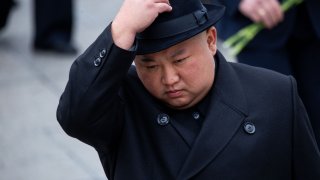Russia and North Korea’s Partnership of Pariahs: Will it Last?
Moscow’s interest in Pyongyang will hold only as long as the Ukraine War continues.
One of the more unexpected outcomes of the Russo-Ukrainian war has been the revitalized partnership between Russia and North Korea. For Pyongyang, this renewed relationship is particularly advantageous as it reduces North Korea’s dependence on China. For Moscow, North Korea’s stockpiles of artillery are crucial to Russia’s war effort in Ukraine, as well as a blatant and defiant violation of international sanctions.
Under Kim Jong-un’s byungin line, the North Korean regime has prioritized the parallel development of both military and economic sectors. Arms sales to Russia serve a dual purpose, advancing North Korea’s military ambitions while generating much-needed economic resources. Historically, North Korea has been uneasy aligning itself too closely within a Sinocentric sphere of influence.
With Russia’s war in Ukraine, Pyongyang no longer needs to rely almost entirely on China for foreign currency or its development needs. In exchange for North Korea’s artillery ammunition, Russia is supplying hard currency, foodstuffs, and possibly missile technology to the North Koreans. This financial boost has significantly benefited Kim Jong-un’s domestic 20x10 economic strategy, which aims to enhance growth in rural areas while centralizing economic power in the party elite, away from regional authorities and local administrators.
Russia has acquired critical artillery ammunition from North Korean stockpiles, bolstering its heavy artillery bombardment strategy in Ukraine. Ukraine’s intelligence chief recently commented that North Korea, rather than China or Iran, is Russia’s most significant ally for their war machine.
The Russians are now openly disregarding international sanctions on North Korea and appear to be involved in a de facto military alliance with the regime. This rejuvenated friendship with Pyongyang does little to damage Russia’s legitimacy on the world stage further, as Putin’s invasion of Ukraine had already relegated Moscow to the rank of pariah and rogue state. Russia’s closest allies currently include North Korea, Iran, Belarus, Venezuela, Syria, and Cuba, hardly the most respected members of the international community.
Russia’s renewed relationship with North Korea also aligns with the ideological framework of the Putin regime. Rooted in a deep-seated hostility toward Western liberalism, Putin promotes pseudo-traditionalist values and nationalistic zeal. Putin’s leading ideologue, Alexander Dugin, has openly expressed his admiration for the North Korean ideology of Juche (self-reliance). North Korea, with its staunch anti-imperialist stance, shares these principles of anti-Westernism, embodying an extreme form of national sovereignty. Both nations view the international liberal order as a Trojan horse for American hegemony and are determined to dismantle it.
The Chinese government likely disapproves of Moscow's revitalized relationship with Pyongyang. Historically, China has regarded Korea as a quasi-vassal state serving the interests of the “Middle Kingdom” and may interpret Pyongyang’s renewed closeness with Russia as a subtle betrayal.
However, in the larger geopolitical context, the continuation of the war in Ukraine serves Xi Jinping’s strategic goals by depleting Western resources and diverting attention away from the Asia-Pacific region. China’s ultimate objective is the eventual reunification of Taiwan with the mainland. The growing ties between Russia and North Korea do not detract from this overarching geopolitical ambition of the Chinese Communist Party.
The question remains about what happens after the Ukraine war. Will the special relationship between Russia and North Korea endure? North Korea certainly hopes so. However, the Putin regime will likely scale back its engagement with the DPRK once the conflict concludes. Despite Russia’s current status as a pariah in the international system, it ultimately seeks to regain access to global financial and economic channels, suggesting that its long-term commitment to North Korea may be limited.
Benjamin R. Young is a Stanton Foundation nuclear security fellow at the RAND, a nonprofit, nonpartisan research institution. He is the author of Guns, Guerillas, and the Great Leader: North Korea and the Third World (Stanford University Press, 2021).
Image: Alexander Khitrov / Shutterstock.

